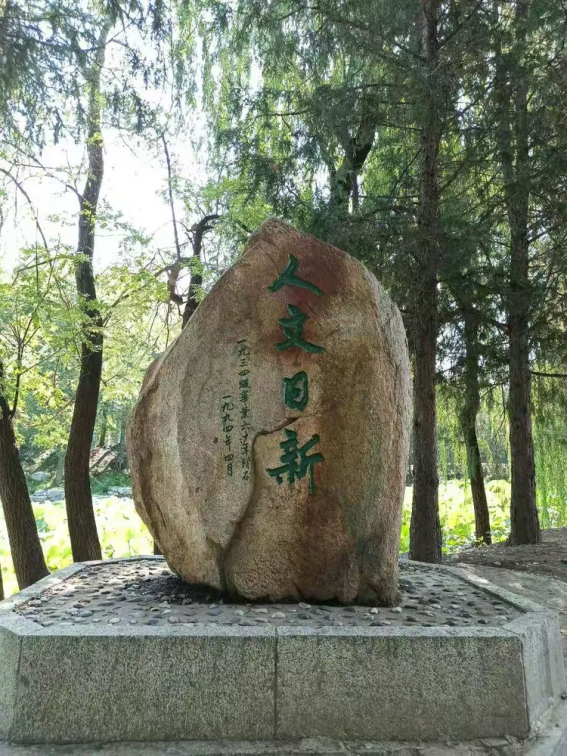编者按:
子曰:“吾十有五而志于学,三十而立,四十而不惑,五十而知天命,六十而耳顺,七十而从心所欲,不逾矩。”
——《论语·为政篇》
哲学是对生命和世界的深刻叩问。 本周“人文日新”栏目以五则经典文本串联起人类对自我、知识与世界的永恒追寻。从《论语》中孔子自述的人生进阶,到《理想国》中“灵魂转向”的教育哲思;从海德格尔“诗意栖居”的存在之思,到杜兰特笔下哲学向科学延伸的探索之路,再到康德心中璀璨星空与道德律令的交相辉映。这些文字跨越时空,共同指向人的成长、认知与超越。愿这些思想碎片如星火,照亮日常,滋养心灵,引领我们在纷繁现实中栖居诗与思。人文日新,躬行不辍。
本周领读:张成萍、李平、雷毅
一、《论语·为政篇》
子曰:“吾十有五而志于学,三十而立,四十而不惑,五十而知天命,六十而耳顺,七十而从心所欲,不逾矩。”
——《论语·为政篇》
英文译文(译者:许渊冲):
At fifteen, said the Master, I was fond of learning. At thirty, I was established. At forty, I did not waver. At fifty, I knew my sacred mission. At sixty, I had a discerning ear. At seventy, I could do what I would without going beyond what is right.
二、《理想国》
“教育实际上并不像某些人在自己的职业中所宣称的那样……能把灵魂里原来没有的知识灌输到灵魂里去,好像他们能把视力放进瞎子的眼睛里去似的。……但是我们现在的论证说明,知识是每个人灵魂里都有的一种能力,而每个人用以学习的器官就像眼睛。——整个身体不改变方向,眼睛是无法离开黑暗转向光明的。同样,作为整体的灵魂必须转离变化世界,直至它的“眼睛”得以正面观看实在,观看所有实在中最明亮者,即我们所说的善者。是这样吧?”
——《理想国》第七卷《洞穴寓言》, 张竹明译
英文译文:
“But then, if I am right, certain professors of education must be wrong when they say that they can put a knowledge into the soul which was not there before, like sight into blind eyes....Whereas, our argument shows that the power and capacity of learning exists in the soul already; and that just as the eye was unable to turn from darkness to light without the whole body, so too the instrument of knowledge can only by the movement of the whole soul be turned from the world of becoming into that of being, and learn by degrees to endure the sight of being, and of the brightest and best of being, or in other words, of the good.”
——Plato, Republic (Book VII, Allegory of the Cave), trans. Benjamin Jowett
三、《诗·语言·思想》
“人诗意地栖居在这片大地上。”
这句话的意思是:人,作为人,栖居于大地之上,当且仅当他能承担此在的本质,也就是说,当他能够领会存在本身。栖居是人的最本质的存在关系。
——海德格尔《诗·语言·思想》(孙周兴 译,收录在《荷尔德林诗的阐释》)
英文译文:
“Poetically man dwells on this earth.”
This means: man dwells as a human being on this earth, when he is capable of dwelling. He is capable of dwelling when he can stand in the presence of the being of beings. Dwelling is the basic character of Being in keeping with which mortals exist.
——Poetry, Language, Thought, trans. Albert Hofstadter
德文原文:
“Dichterisch wohnet der Mensch auf dieser Erde.”
Das sagt: der Mensch wohnt als Mensch auf dieser Erde, wenn er das Dasein als ein solches vermag, das heißt: wenn er das Sein als Sein vermag. Wohnen ist das eigentlichste Seinsverhältnis des Menschen.
四、《哲学的故事》
一旦某个研究领域能够产生可被精确表述的知识,它便被称为科学。每一门科学都始于哲学而终于艺术;它起源于假设,而汇流于成就。哲学是对未知(如形而上学中)或所知不确之物(如伦理学或政治哲学中)的假设性诠释;它是围攻真理的前沿战壕。科学是已攻占的领土;其后方是安全区域,知识与艺术在那里构建着不完美却非凡的世界。哲学看似停滞不前、困顿迷茫;但这仅仅是因为她把胜利的果实留给了她的女儿——诸科学,而自己则神圣地不满足于现状,继续向不确定与未探索的领域进发。
——威尔·杜兰特,选自《哲学的故事》(1926)“导言:论哲学的功用”
英文原文:
...soon as a field of inquiry yields knowledge susceptible of exact formulation it is called science. Every science begins as philosophy and ends as art; it arises in hypothesis and flows into achievement. Philosophy is a hypothetical interpretation of the unknown (as in metaphysics), or of the inexactly known (as in ethics or political philosophy); it is the front trench in the siege of truth. Science is the captured territory; and behind it are those secure regions in which knowledge and art build our imperfect and marvelous world. Philosophy seems to standstill, perplexed; but only because she leaves the fruits of victory to her daughters the sciences, and herself passes on, divinely discontent, to the uncertain and unexplored.
——Will Durant, On the Uses of Philosophy, The Story of Philosophy
五、《实践理性批判》
有两样东西,人们越是经常持久地对之凝神思索,它们就越是使内心充满常新而日增的惊奇和敬畏:我头上的星空和我心中的道德律。
——康德《实践理性批判》(邓晓芒 译 )
德文原文:
Zwei Dinge erfüllen das Gemüt mit immer neuer und zunehmender Bewunderung und Ehrfurcht, je öfter und anhaltender sich das Nachdenken damit beschäftigt: der bestirnte Himmel über mir und das moralische Gesetz in mir.
常见的英译本(Norman Kemp Smith译):
Two things fill the mind with ever new and increasing admiration and awe, the more often and steadily we reflect upon them: the starry heavens above me and the moral law within me.
【栏目寄语】
“人文日新”,源自清华百年精神内核,意指人文精神的传承与革新。
“人文日新”栏目,愿以每日晨读为微光,与您共燃思想星火。
“人文日新”不止于晨读,更是对永恒命题的求索。

“人文日新”碑,由清华1934级校友于毕业60周年之际(1994年)敬赠母校,并于校庆83周年纪念日隆重落成。碑上镌刻的“人文日新”四字,正是清华校园文化与精神的核心象征。
1934级堪称清华校史上群星璀璨的一届。这方纪念碑的捐赠者们,有许多如雷贯耳的名字:季羡林、夏鼐、吴晗、翁文波、张宗燧、孙德和、时钧、高振衡、徐芝纶、张青莲、陈省身、张光斗、赵九章、钱学森、顾功叙、张煦……他们以人文之思、科学之光、工程之智,共同诠释了“日新”的真谛——在传承中突破,在坚守中新生。
“人文日新”栏目由清华大学深圳国际研究生院人文社会科学部主办,自2025年9月启动,以每日经典晨读,启迪智慧,滋养心灵。更多精彩内容将每日通过“SIGS艺术与人文”微信公众号发布,欢迎广大读者踊跃投稿。
供稿:人文社会科学部
统筹:张成萍、陈芷洹








